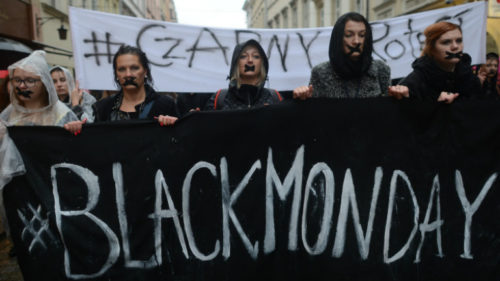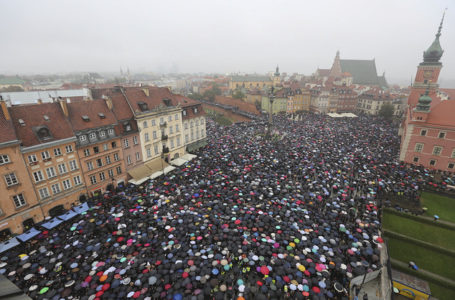The Pregnancy Trap: Reproductive Rights in Poland
“You don’t have to be Polish to be paying an enormous price for this” – Irene Donadio, IPPF

Women participate in the Black Monday protest on October 03, 2016 in Warsaw, Poland. (Photo by Artur Widak/NurPhoto)
Imagine yourself as a Polish woman living in a midsized town. One night, life happens and you realize you were not as safe as you thought during your weekend fling. You know that you’re living under some of Europe’s strictest abortion laws – so in an effort to be responsible, you just head to the pharmacy to pick up an emergency contraceptive, right? Wrong.
Activists in Poland have already had a very busy and difficult few years fighting the 2015/2016 pushes to make already restrictive abortion laws even stricter. But now with a new bill limiting access to emergency contraception just passed, it is difficult for women to remain at all optimistic about their role in their own reproductive rights.
Voted in officially June 23rd, this new bill makes emergency contraception, which was available over the counter previously, now only available by prescription. Additionally, there exists a “conscience clause” meaning doctors have no fiduciary duty to prescribe or accept a patient requesting a prescription for emergency contraception if it conflicts with their values. So one not only now has to get a prescription, but “shop around” for a doctor until they find one willing to prescribe emergency contraception. This process, aside from being highly ethically questionable, delays women from acquiring emergency contraception. Timeframe is especially pertinent in this case because emergency contraception must be taken within 5 days of sexual activity. Its effectiveness drops substantially as days pass.

An ad clearly not made for Polish women.
This presents a sort of “pregnancy trap” for Polish women who already face some of the most restrictive abortion laws in Europe. Abortion is only legal in cases of rape, incest, or extreme health risk. So without adequate access to emergency contraceptive, they are practically forced into pregnancy as they are often left without solutions in times of contraceptive failure or simple mistake.

A sea of protestors during the Black Monday protests of 2016 (AP Photo/Czarek Sokolowski)
Poland considered even removing the exception allowing for abortion in cases of rape and incest, but the motion was ultimately defeated thanks to massive public outcry and the now famous Black Monday protests. Polish women shook the world stage with their Black Monday protests, but since then it seems the world has lost interest. Many Europeans are unaware of the actions still happening in Poland and of the recent bill limiting access to emergency contraception. I spoke with Irene Donadio, Senior Advocacy Officer from International Planned Parenthood, to get her take on the issue. She explained that this is not an isolated issue; it affects everyone – men and women alike.
“Any of your friends could go to Poland as an ERASMUS student, or on holiday, it can happen to anyone – you don’t have to be Polish to be paying an enormous price for this” Irene Donadio, Senior Advocacy Officer, IPPF
Unfortunately, young people often don’t realize the effects of limits to sexual health resources until it is too late. The inconsistency in the health system and wildly varying standards for reproductive rights within the EU are widely unknown amongst the general public until it directly affects them. As eloquently summarized by Stephen Harsley, an Advocacy Trainee at IPPF:
“Reproductive freedoms tend to be something you don’t care about – until you have to care about them.”
A restriction to reproduction freedoms in Poland affects the EU as a whole. The first step is acknowledging the issue, then becoming educated, and finally taking action. We may seem far removed from the issue, in Brussels especially, but we do have power to support those fighting this bill in Poland. Donadio explained that in situations like these where restrictive legislation is coming from a powerful national government, a “sandwich technique” is useful to aiding grassroots activists in their struggle. This means that while they do work on the local level, we can work to put pressure from the EU side as well. Essentially this causes a simultaneous top-down and bottom-up call for reform.
But why should the average EU citizen or Place Lux veteran care?
“If you’re looking at Pluxers (…) If they really cherish this European Project – there are elements that need to be protected and this is a crucial part of it. Things are not as they’re supposed to be.” Anja Pedersen, YSAFE Coordinator and IPPF intern
Alright, so you’re engaged, you’re curious, maybe you even want to get involved. Below I have listed a few of the best resources to get further information both on this bill and on reproductive freedoms more generally. Solidarity in the EU goes beyond migrant quotas and ERASMUS semesters. Staying informed about what’s going on across the union is vital. So have a read, and use your knowledge, power, and voice wisely.
WHO Fact Sheet on Emergency Contraceptives:
http://www.who.int/mediacentre/factsheets/fs244/en/
European Medicines Agency report on safety of Emergency Contraceptive, EllaOne:
International Planned Parenthood European Network:
http://www.ippfen.org/ (Main Site)
http://www.ippfen.org/news/announcements/ippf-en-condemns-polish-move-restrict-womens-access-contraception (Statement on the Emergency Contraceptive Bill)
YSAFE (Youth Sexual Awareness for Europe) – Youth Network to get involved & informed:
